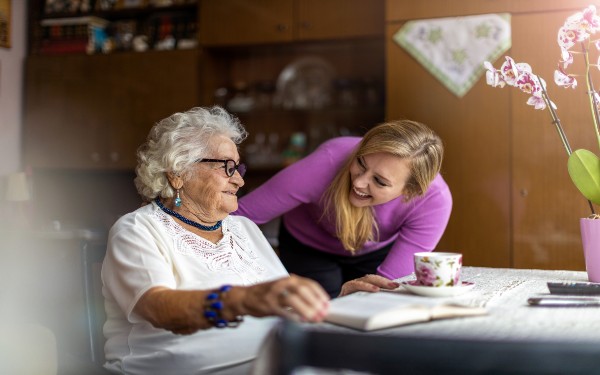
by Lisa Norton
I am an advanced practitioner specialising in continuing healthcare on behalf of a local authority.
My role is to attend multidisciplinary meetings with a nurse assessor, next of kin, and a representative from the care home. The purpose of the meeting is to see if a person is eligible for continuing healthcare funding, provided by the local integrated care board.
I am also based in the community rapid response team, which supports the prevention of hospital admissions, and cover the intake service twice a month, triaging referrals into the team. In addition, I am a trainee practice educator and am currently supporting a student on their final, 100-day placement.
8 am: I take a deep breath and mentally prepare myself for my day as intake manager. It is not my main role and I am new to the team. I will be working from home today and the rest of the team is hybrid as we cover half of a large county. They will be out completing visits and writing up assessments and reviews.
8:30 am: I have logged onto the social work system we use and checked the virtual tray for any new referrals. My role is to see which ones are suitable to accept and then the team has two hours to respond to them. Some of the time is spent re-triaging cases back to the wider community locality teams, as we don’t always have capacity to accept.
Each practitioner can usually only visit one person a day for an assessment. It takes a lot of time to support the person alongside travel, assessing, completing write-ups and sourcing support. Being new, I am still getting to grips with how the team works and what referrals we accept. But the team is great and everyone is supportive when I have questions.
9 am: I check in on my student via Teams to make sure she is okay as we have her midway meeting later this morning. Having a student is giving me additional time to reflect on my own practice, which is interesting and enjoyable.
10 am: I checked the email tray and found a new referral from a hospital at home GP, which is a community based service providing nurses and therapy in people’s homes. The person in question is not coping well with tasks such as personal care and meal preparation. They need an urgent visit for an assessment for a package of care. I accept the referral.
11 am: I have a midway meeting with the student and their university tutor. It lasts an hour and a half, and the student has to do a case presentation to show her learning from a case she jointly worked on with me. The meeting goes well, and the student passes this stage. We update the learning opportunities plan on how she can meet the ninth Professional Capabilities Framework (PCF) domain, which focuses on leadership and is often hard for students to meet. We decided that she would do a presentation on continuing healthcare to another student due to shadow me to help her meet this.
12:30 pm: I check the in-tray and two new referrals have come in. I can allocate one, but the other one I have to reassign as we don’t have capacity to accept it today. I ask an advanced practitioner in the referring team to make sure the person is safe and check in again tomorrow morning.
1 pm: I send the student an email with information on continuing healthcare and ideas about the presentation.
1:30 pm: It’s my lunch break and some much-needed time away from the desk and computer.
2 pm: I have a Teams meeting with a nurse assessor to discuss a recent decision support tool (DST) meeting, where we determine whether a person is eligible for continuing healthcare funding.
The DST focuses on a person’s current needs and how they are impacting on the care they are currently receiving either at home or in a care home.
There are 12 different areas where an individual score is allocated, called “domains”, but I had previously wanted further investigation from the GP for one of them. I had felt it was in that person’s best interests to have their mental health reviewed as it was having a significant impact on the care they were receiving in the care home. I asked the GP to consider prescribing an anti-depressant and, after carrying out a review, they prescribed the medication and we met today to conclude the DST. During the meeting, we gave a score to this domain and agreed on a recommendation regarding the person’s eligibility.
3 pm: I telephoned the family to give them an update. Their family member is currently on fast-track funding and is no longer eligible for our service as they have made a full recovery. I am always happy when people come off this pathway, as it means their health has improved. I can then have a conversation with them and their families about the least restrictive care options going forward, such as returning home.
3:30 pm: The intake tray remains quiet, with no new referrals, and I can continue with the social care report from the earlier DST meeting. I also email the family some information on funding as their family member’s savings don’t meet the required threshold. I then start the paperwork for getting their care responsibility transferred over to the local authority. The fast-track funding provided by health services will now be stopped due to them coming off the pathway.
They will need to remain in the care home so a continuation of funding is required as they are not a self-funders. There is a lot of paperwork to be completed, and this will take me some time to do, but I enjoy it.
4 pm: I check in with the student to see how she is getting on writing up the presentation and offer guidance. None is needed, and I am pleased to see she can work autonomously.
5 pm: I finish for the day.







 Bournemouth, Christchurch and Poole
Bournemouth, Christchurch and Poole  Hampshire County Council
Hampshire County Council  Oxfordshire County Council
Oxfordshire County Council  South Gloucestershire Council
South Gloucestershire Council  Wokingham Borough Council
Wokingham Borough Council  Providing a lifeline for social workers who want to get back into the sector
Providing a lifeline for social workers who want to get back into the sector  The highs and lows of a children’s services’ transformation journey
The highs and lows of a children’s services’ transformation journey  Embedding learning in social work teams through a multi-agency approach
Embedding learning in social work teams through a multi-agency approach  The family safeguarding approach: 5 years on
The family safeguarding approach: 5 years on  Harnessing social work values to shape your career pathway
Harnessing social work values to shape your career pathway  Workforce Insights – showcasing a selection of the sector’s top recruiters
Workforce Insights – showcasing a selection of the sector’s top recruiters  Join our team to help technology enabled care transform lives in Nottinghamshire
Join our team to help technology enabled care transform lives in Nottinghamshire 

 Facebook
Facebook X
X LinkedIn
LinkedIn Instagram
Instagram
You lost me with agreement with nurse assessor, my experience is that you can have a client with most complex needs and still they will be saying that it’s not chc eligible